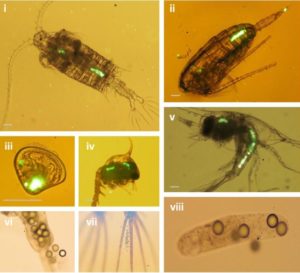Research Scientists meet with ADIMS and KFN Guardian Watchmen on Denman Island
by Barbara Mills
Governments change, and government bureaucracies often evolve too slowly to address even the most urgent needs of a community and the environmental ecosystems that sustain them. Often community-powered, locally informed initiatives have to be the first step to jump start meaningful action. This is what is happening in Baynes Sound and Lambert Channel, one of the most important ecosystems on the coast of BC.
Last Saturday members of the K’omoks First Nation (KFN) Guardian Watchmen and the Association for Denman Island Marine Stewards (ADIMS) co-hosted UBC scientists Brian Hunt, Juan Jose Alava, and Natalie Mahara, who will research the impact of marine microplastic contamination on the health of zooplankton, and subsequently on the early growth stages of herring larvae in Baynes Sound.

Saturday’s initial visit was a field test for six further samplings planned for March and April, approximately one every week after the herring spawn, until most of the young herring leave Baynes Sound. Later samplings, to be taken in August in the Strait of Georgia by other researchers, will augment our research, and may show ingestion of microplastics in juvenile herring.
This zooplankton research is one of three locally generated initiatives that involve cooperative planning and funding between First Nations, local environmental organizations, local governments, as well as environmental organizations that work at the national level.
The second is the Pollution Tracker project, which has taken samples from the north end of Baynes Sound this February, and will report back to us on the presence of heavy metals, microplastics and several persistent organic pollutants, like PCBs and DDT.
The third initiative began with the Baynes Sound and Lambert Channel Ecosystem Forum in May of 2018, when we met with over 40 other stakeholders to share knowledge and identify collaborative actions to support the health of this ecosystem. Two further roundtables are planned for March and October this year.
We are hoping that these initiatives will encourage governmental bodies to more urgently address the complex needs of this vital region.